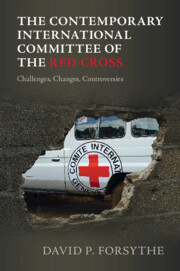
- Publisher:
- Cambridge University Press
- Online publication date:
- February 2024
- Print publication year:
- 2024
- Online ISBN:
- 9781009387002

The International Committee of the Red Cross (ICRC) was founded in 1863 and is often considered the gold standard in humanitarian action. Despite its many positive achievements over more than 150 years, some former ICRC officials believe that the organization is now in decline because of a series of recent policy choices. Their view is that the organization has undermined its reputation for independent and neutral humanitarian action, while growing too fast and too large, which has weakened its reputation for quick, tightly focused, and effective action in the field. David P. Forsythe revisits the ICRC policy decisions of recent decades and suggests that the organization is not in fatal decline, but that it does need to reconsider some of its policies at the margins. Though some errors have been made and some corrections are in order, Forsythe argues that its obituary is premature.
‘David P. Forsythe has written an absorbing and knowledgeable account of the turmoil in the humanitarian industry and its most crucial component, the ICRC. His diagnosis and prescription is essential for anyone wishing to understand the sector’s current turbulence or come to the rescue of vulnerable populations.’
Thomas G. Weiss - Distinguished Fellow, Global Governance, the CUNY Graduate Center
‘By synthesizing its past and asking pertinent questions of its future, Forsythe’s The Contemporary International Committee of the Red Cross: Challenges, Changes, Controversies reveals a unique insight into the ICRC’s inner workings, and a deeply informed perspective on how it has - and hasn’t - evolved to meet the challenges of a changing world, from the battlefields of the Italian Wars of Unification to the Russian invasion of Ukraine.’
James Crossland - Liverpool John Moores University and author of War, Law and Humanity: The Campaign to Control Warfare, 1853–1914
‘David P. Forsythe is the foremost academic expert on the ICRC. Over five decades, he has shown himself to be a kind critic, occasionally finding fault with particular decisions, but supportive of the overall direction of travel. In this sizeable volume, he synthesizes much of his earlier scholarship and evaluates more recent policy developments, with a focus on institutional expansion during Peter Maurer’s 2012-2022 presidency. Benefiting from privileged access to people and paperwork in this notoriously secretive organization, Forsythe delivers new information and insightful analysis, and one need not agree with all his claims or conclusions to find a great deal of value here.’
Miriam Bradley - Senior Lecturer in Humanitarian Studies, University of Manchester
‘Few outsiders know the ICRC as well as David Forsythe does. This book offers unique insight into that organization's recent transformations, sharply tackling the critical questions in Forsythe's singular style.’
Giovanni Mantilla - Associate Professor of International Relations, and Fellow of Christs's College, University of Cambridge
‘Forsythe reveals that the ICRC and other members of the International Red Cross and Red Crescent Movement have always been intensely political organizations. Current problems include task expansion; a possible loss of focus on the ICRC’s original mandate; and a pro-capitalist orientation.’
Rhoda Howard-Hassmann - Professor Emeritus, Wilfrid Laurier University, Canada
‘… indispensable for any research on the ICRC’s evolution, from policy statements to funding and the range of its activities … A great resource for researchers of humanitarianism … Highly recommended.’
J. M. Rich Source: Choice
 Loading metrics...
Loading metrics...
* Views captured on Cambridge Core between #date#. This data will be updated every 24 hours.
Usage data cannot currently be displayed.